Financial Management Report: Dividend Policies and BREXIT in Finance
VerifiedAdded on 2020/10/05
|10
|2668
|322
Report
AI Summary
This report on financial management delves into the intricacies of dividend policies and the implications of BREXIT on the financial services industry. It begins by analyzing two contrasting perspectives on dividend policy: the residual income approach, which prioritizes dividend payments after capital expenditures, and the zero dividend policy, which focuses on capital appreciation. The report then explores the impact of BREXIT on the financial sector, highlighting challenges such as increased capital requirements, regulatory changes, and the potential loss of London's status as a financial hub. The analysis covers the effects on financial institutions, including banks and other service providers, emphasizing the need for strategic adaptation to maintain operational efficiency and competitiveness. The conclusion summarizes the key findings, underscoring the importance of strategic financial management in navigating the evolving economic landscape.

TOPIC:
Financial Management
Financial Management
Paraphrase This Document
Need a fresh take? Get an instant paraphrase of this document with our AI Paraphraser
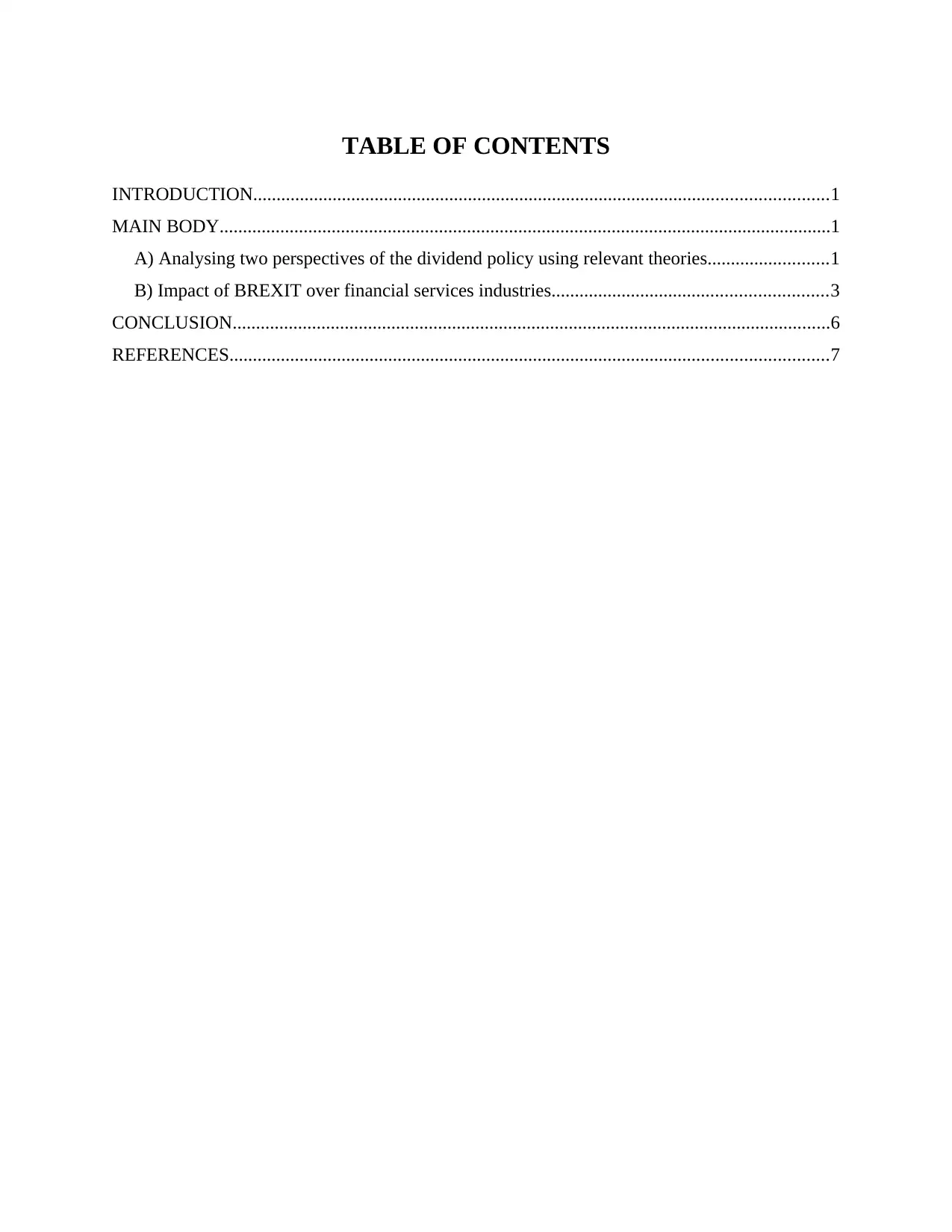
TABLE OF CONTENTS
INTRODUCTION...........................................................................................................................1
MAIN BODY...................................................................................................................................1
A) Analysing two perspectives of the dividend policy using relevant theories..........................1
B) Impact of BREXIT over financial services industries...........................................................3
CONCLUSION................................................................................................................................6
REFERENCES................................................................................................................................7
INTRODUCTION...........................................................................................................................1
MAIN BODY...................................................................................................................................1
A) Analysing two perspectives of the dividend policy using relevant theories..........................1
B) Impact of BREXIT over financial services industries...........................................................3
CONCLUSION................................................................................................................................6
REFERENCES................................................................................................................................7
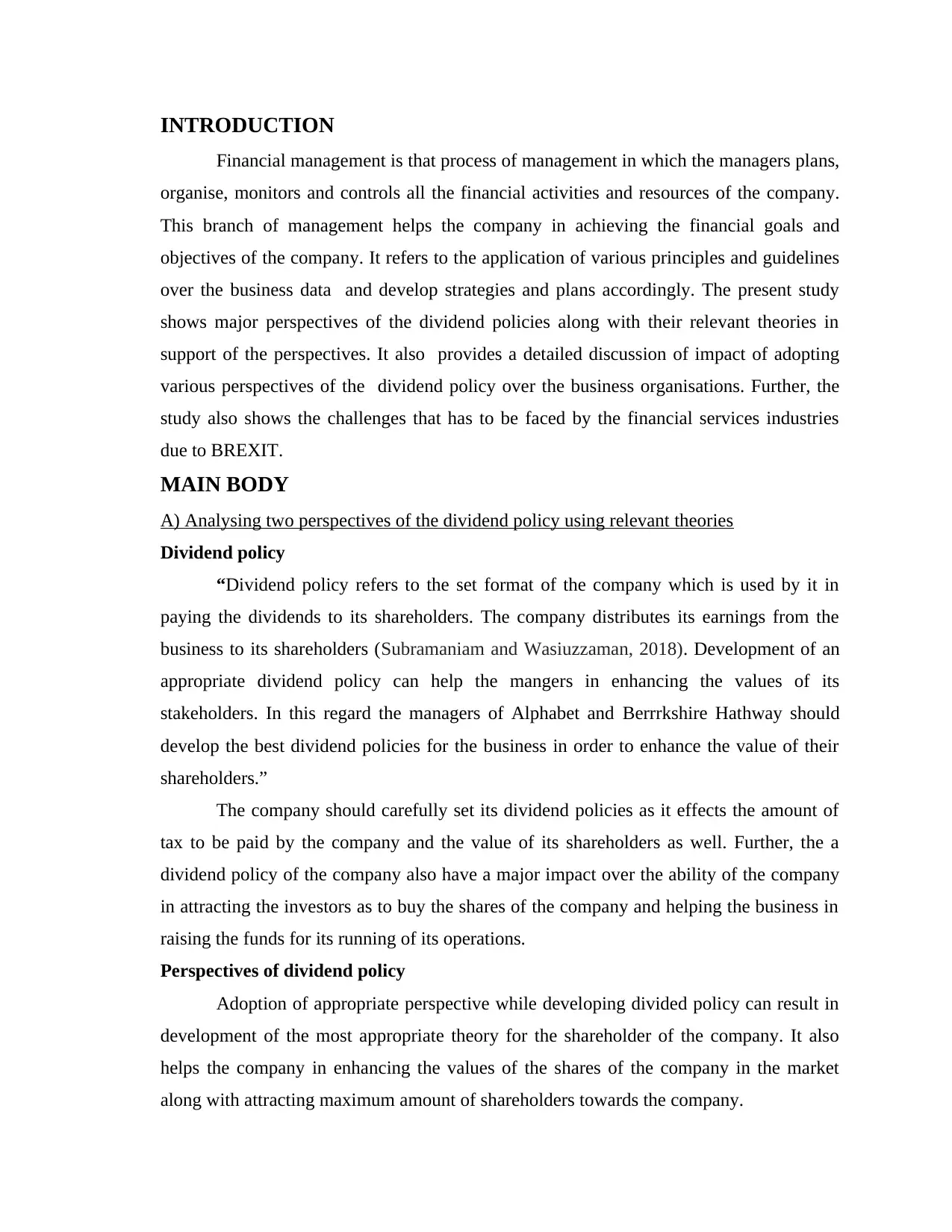
INTRODUCTION
Financial management is that process of management in which the managers plans,
organise, monitors and controls all the financial activities and resources of the company.
This branch of management helps the company in achieving the financial goals and
objectives of the company. It refers to the application of various principles and guidelines
over the business data and develop strategies and plans accordingly. The present study
shows major perspectives of the dividend policies along with their relevant theories in
support of the perspectives. It also provides a detailed discussion of impact of adopting
various perspectives of the dividend policy over the business organisations. Further, the
study also shows the challenges that has to be faced by the financial services industries
due to BREXIT.
MAIN BODY
A) Analysing two perspectives of the dividend policy using relevant theories
Dividend policy
“Dividend policy refers to the set format of the company which is used by it in
paying the dividends to its shareholders. The company distributes its earnings from the
business to its shareholders (Subramaniam and Wasiuzzaman, 2018). Development of an
appropriate dividend policy can help the mangers in enhancing the values of its
stakeholders. In this regard the managers of Alphabet and Berrrkshire Hathway should
develop the best dividend policies for the business in order to enhance the value of their
shareholders.”
The company should carefully set its dividend policies as it effects the amount of
tax to be paid by the company and the value of its shareholders as well. Further, the a
dividend policy of the company also have a major impact over the ability of the company
in attracting the investors as to buy the shares of the company and helping the business in
raising the funds for its running of its operations.
Perspectives of dividend policy
Adoption of appropriate perspective while developing divided policy can result in
development of the most appropriate theory for the shareholder of the company. It also
helps the company in enhancing the values of the shares of the company in the market
along with attracting maximum amount of shareholders towards the company.
Financial management is that process of management in which the managers plans,
organise, monitors and controls all the financial activities and resources of the company.
This branch of management helps the company in achieving the financial goals and
objectives of the company. It refers to the application of various principles and guidelines
over the business data and develop strategies and plans accordingly. The present study
shows major perspectives of the dividend policies along with their relevant theories in
support of the perspectives. It also provides a detailed discussion of impact of adopting
various perspectives of the dividend policy over the business organisations. Further, the
study also shows the challenges that has to be faced by the financial services industries
due to BREXIT.
MAIN BODY
A) Analysing two perspectives of the dividend policy using relevant theories
Dividend policy
“Dividend policy refers to the set format of the company which is used by it in
paying the dividends to its shareholders. The company distributes its earnings from the
business to its shareholders (Subramaniam and Wasiuzzaman, 2018). Development of an
appropriate dividend policy can help the mangers in enhancing the values of its
stakeholders. In this regard the managers of Alphabet and Berrrkshire Hathway should
develop the best dividend policies for the business in order to enhance the value of their
shareholders.”
The company should carefully set its dividend policies as it effects the amount of
tax to be paid by the company and the value of its shareholders as well. Further, the a
dividend policy of the company also have a major impact over the ability of the company
in attracting the investors as to buy the shares of the company and helping the business in
raising the funds for its running of its operations.
Perspectives of dividend policy
Adoption of appropriate perspective while developing divided policy can result in
development of the most appropriate theory for the shareholder of the company. It also
helps the company in enhancing the values of the shares of the company in the market
along with attracting maximum amount of shareholders towards the company.
⊘ This is a preview!⊘
Do you want full access?
Subscribe today to unlock all pages.

Trusted by 1+ million students worldwide
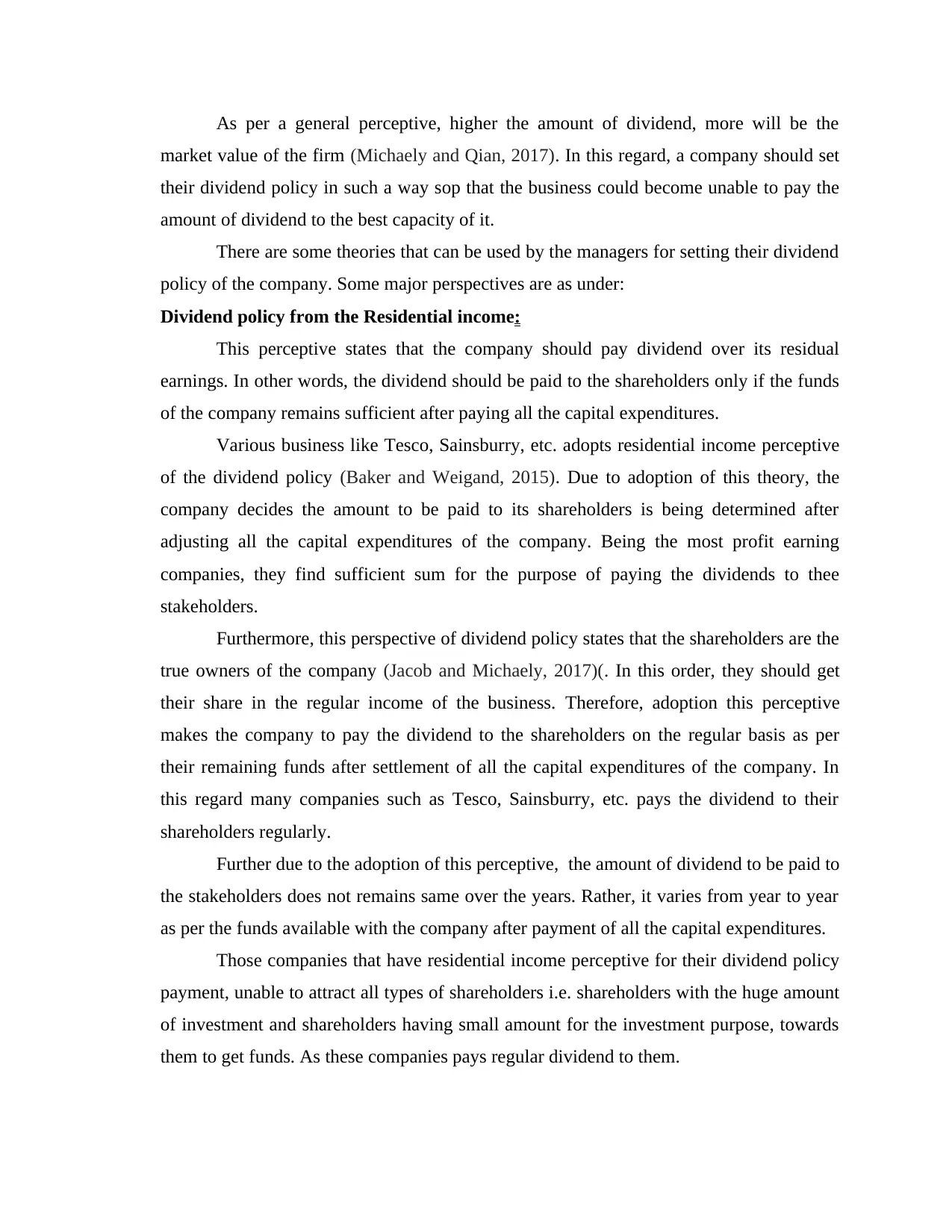
As per a general perceptive, higher the amount of dividend, more will be the
market value of the firm (Michaely and Qian, 2017). In this regard, a company should set
their dividend policy in such a way sop that the business could become unable to pay the
amount of dividend to the best capacity of it.
There are some theories that can be used by the managers for setting their dividend
policy of the company. Some major perspectives are as under:
Dividend policy from the Residential income:
This perceptive states that the company should pay dividend over its residual
earnings. In other words, the dividend should be paid to the shareholders only if the funds
of the company remains sufficient after paying all the capital expenditures.
Various business like Tesco, Sainsburry, etc. adopts residential income perceptive
of the dividend policy (Baker and Weigand, 2015). Due to adoption of this theory, the
company decides the amount to be paid to its shareholders is being determined after
adjusting all the capital expenditures of the company. Being the most profit earning
companies, they find sufficient sum for the purpose of paying the dividends to thee
stakeholders.
Furthermore, this perspective of dividend policy states that the shareholders are the
true owners of the company (Jacob and Michaely, 2017)(. In this order, they should get
their share in the regular income of the business. Therefore, adoption this perceptive
makes the company to pay the dividend to the shareholders on the regular basis as per
their remaining funds after settlement of all the capital expenditures of the company. In
this regard many companies such as Tesco, Sainsburry, etc. pays the dividend to their
shareholders regularly.
Further due to the adoption of this perceptive, the amount of dividend to be paid to
the stakeholders does not remains same over the years. Rather, it varies from year to year
as per the funds available with the company after payment of all the capital expenditures.
Those companies that have residential income perceptive for their dividend policy
payment, unable to attract all types of shareholders i.e. shareholders with the huge amount
of investment and shareholders having small amount for the investment purpose, towards
them to get funds. As these companies pays regular dividend to them.
market value of the firm (Michaely and Qian, 2017). In this regard, a company should set
their dividend policy in such a way sop that the business could become unable to pay the
amount of dividend to the best capacity of it.
There are some theories that can be used by the managers for setting their dividend
policy of the company. Some major perspectives are as under:
Dividend policy from the Residential income:
This perceptive states that the company should pay dividend over its residual
earnings. In other words, the dividend should be paid to the shareholders only if the funds
of the company remains sufficient after paying all the capital expenditures.
Various business like Tesco, Sainsburry, etc. adopts residential income perceptive
of the dividend policy (Baker and Weigand, 2015). Due to adoption of this theory, the
company decides the amount to be paid to its shareholders is being determined after
adjusting all the capital expenditures of the company. Being the most profit earning
companies, they find sufficient sum for the purpose of paying the dividends to thee
stakeholders.
Furthermore, this perspective of dividend policy states that the shareholders are the
true owners of the company (Jacob and Michaely, 2017)(. In this order, they should get
their share in the regular income of the business. Therefore, adoption this perceptive
makes the company to pay the dividend to the shareholders on the regular basis as per
their remaining funds after settlement of all the capital expenditures of the company. In
this regard many companies such as Tesco, Sainsburry, etc. pays the dividend to their
shareholders regularly.
Further due to the adoption of this perceptive, the amount of dividend to be paid to
the stakeholders does not remains same over the years. Rather, it varies from year to year
as per the funds available with the company after payment of all the capital expenditures.
Those companies that have residential income perceptive for their dividend policy
payment, unable to attract all types of shareholders i.e. shareholders with the huge amount
of investment and shareholders having small amount for the investment purpose, towards
them to get funds. As these companies pays regular dividend to them.
Paraphrase This Document
Need a fresh take? Get an instant paraphrase of this document with our AI Paraphraser
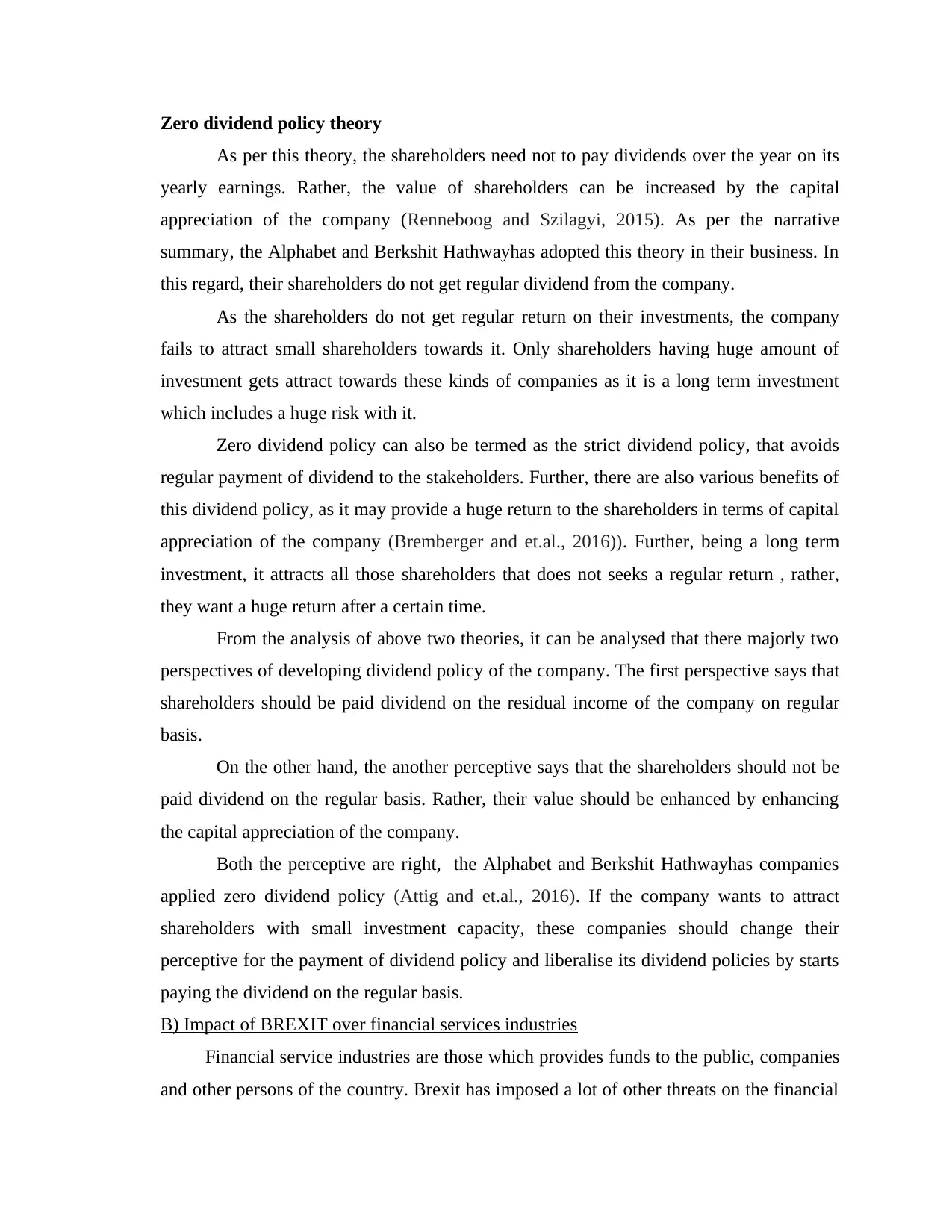
Zero dividend policy theory
As per this theory, the shareholders need not to pay dividends over the year on its
yearly earnings. Rather, the value of shareholders can be increased by the capital
appreciation of the company (Renneboog and Szilagyi, 2015). As per the narrative
summary, the Alphabet and Berkshit Hathwayhas adopted this theory in their business. In
this regard, their shareholders do not get regular dividend from the company.
As the shareholders do not get regular return on their investments, the company
fails to attract small shareholders towards it. Only shareholders having huge amount of
investment gets attract towards these kinds of companies as it is a long term investment
which includes a huge risk with it.
Zero dividend policy can also be termed as the strict dividend policy, that avoids
regular payment of dividend to the stakeholders. Further, there are also various benefits of
this dividend policy, as it may provide a huge return to the shareholders in terms of capital
appreciation of the company (Bremberger and et.al., 2016)). Further, being a long term
investment, it attracts all those shareholders that does not seeks a regular return , rather,
they want a huge return after a certain time.
From the analysis of above two theories, it can be analysed that there majorly two
perspectives of developing dividend policy of the company. The first perspective says that
shareholders should be paid dividend on the residual income of the company on regular
basis.
On the other hand, the another perceptive says that the shareholders should not be
paid dividend on the regular basis. Rather, their value should be enhanced by enhancing
the capital appreciation of the company.
Both the perceptive are right, the Alphabet and Berkshit Hathwayhas companies
applied zero dividend policy (Attig and et.al., 2016). If the company wants to attract
shareholders with small investment capacity, these companies should change their
perceptive for the payment of dividend policy and liberalise its dividend policies by starts
paying the dividend on the regular basis.
B) Impact of BREXIT over financial services industries
Financial service industries are those which provides funds to the public, companies
and other persons of the country. Brexit has imposed a lot of other threats on the financial
As per this theory, the shareholders need not to pay dividends over the year on its
yearly earnings. Rather, the value of shareholders can be increased by the capital
appreciation of the company (Renneboog and Szilagyi, 2015). As per the narrative
summary, the Alphabet and Berkshit Hathwayhas adopted this theory in their business. In
this regard, their shareholders do not get regular dividend from the company.
As the shareholders do not get regular return on their investments, the company
fails to attract small shareholders towards it. Only shareholders having huge amount of
investment gets attract towards these kinds of companies as it is a long term investment
which includes a huge risk with it.
Zero dividend policy can also be termed as the strict dividend policy, that avoids
regular payment of dividend to the stakeholders. Further, there are also various benefits of
this dividend policy, as it may provide a huge return to the shareholders in terms of capital
appreciation of the company (Bremberger and et.al., 2016)). Further, being a long term
investment, it attracts all those shareholders that does not seeks a regular return , rather,
they want a huge return after a certain time.
From the analysis of above two theories, it can be analysed that there majorly two
perspectives of developing dividend policy of the company. The first perspective says that
shareholders should be paid dividend on the residual income of the company on regular
basis.
On the other hand, the another perceptive says that the shareholders should not be
paid dividend on the regular basis. Rather, their value should be enhanced by enhancing
the capital appreciation of the company.
Both the perceptive are right, the Alphabet and Berkshit Hathwayhas companies
applied zero dividend policy (Attig and et.al., 2016). If the company wants to attract
shareholders with small investment capacity, these companies should change their
perceptive for the payment of dividend policy and liberalise its dividend policies by starts
paying the dividend on the regular basis.
B) Impact of BREXIT over financial services industries
Financial service industries are those which provides funds to the public, companies
and other persons of the country. Brexit has imposed a lot of other threats on the financial
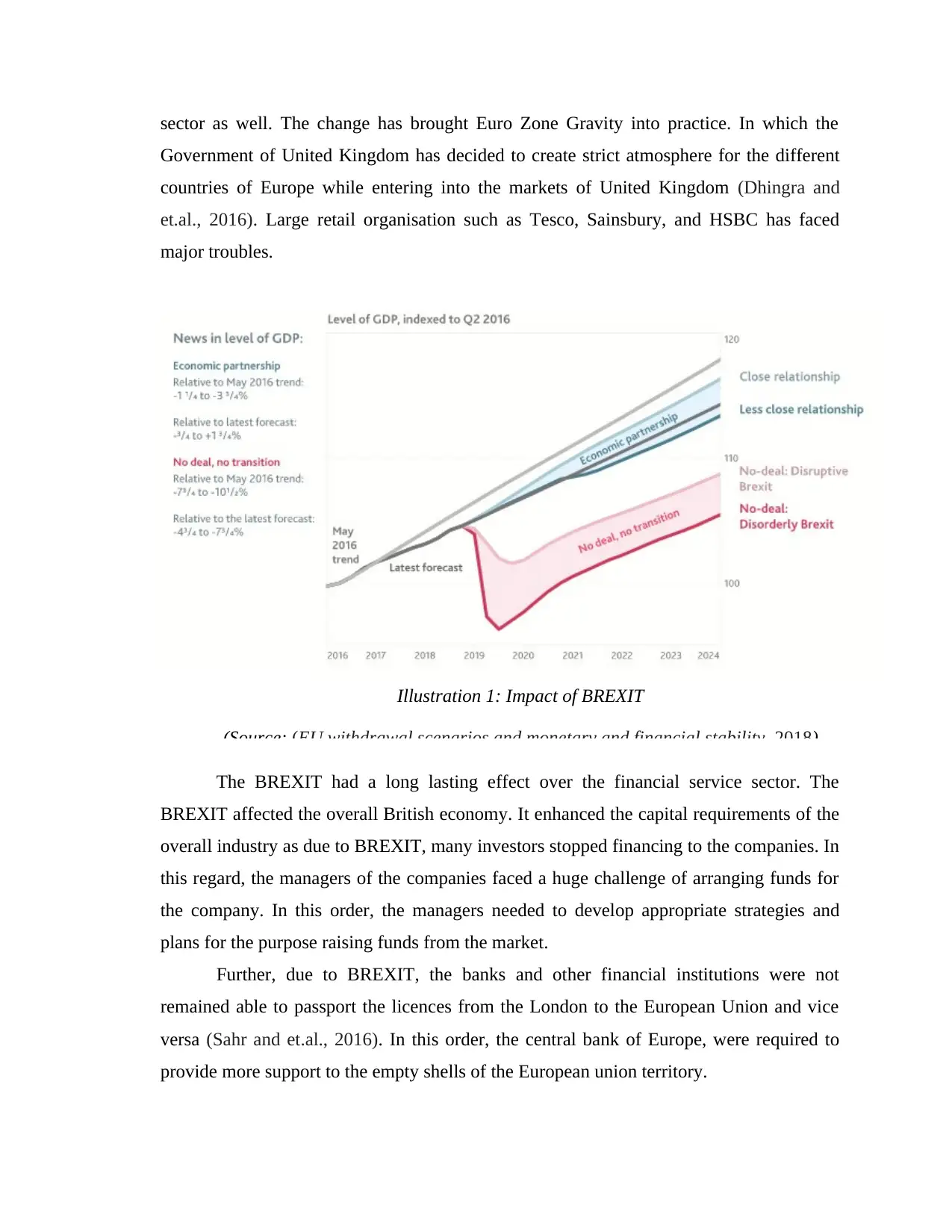
sector as well. The change has brought Euro Zone Gravity into practice. In which the
Government of United Kingdom has decided to create strict atmosphere for the different
countries of Europe while entering into the markets of United Kingdom (Dhingra and
et.al., 2016). Large retail organisation such as Tesco, Sainsbury, and HSBC has faced
major troubles.
The BREXIT had a long lasting effect over the financial service sector. The
BREXIT affected the overall British economy. It enhanced the capital requirements of the
overall industry as due to BREXIT, many investors stopped financing to the companies. In
this regard, the managers of the companies faced a huge challenge of arranging funds for
the company. In this order, the managers needed to develop appropriate strategies and
plans for the purpose raising funds from the market.
Further, due to BREXIT, the banks and other financial institutions were not
remained able to passport the licences from the London to the European Union and vice
versa (Sahr and et.al., 2016). In this order, the central bank of Europe, were required to
provide more support to the empty shells of the European union territory.
Illustration 1: Impact of BREXIT
(Source: (EU withdrawal scenarios and monetary and financial stability, 2018)
Government of United Kingdom has decided to create strict atmosphere for the different
countries of Europe while entering into the markets of United Kingdom (Dhingra and
et.al., 2016). Large retail organisation such as Tesco, Sainsbury, and HSBC has faced
major troubles.
The BREXIT had a long lasting effect over the financial service sector. The
BREXIT affected the overall British economy. It enhanced the capital requirements of the
overall industry as due to BREXIT, many investors stopped financing to the companies. In
this regard, the managers of the companies faced a huge challenge of arranging funds for
the company. In this order, the managers needed to develop appropriate strategies and
plans for the purpose raising funds from the market.
Further, due to BREXIT, the banks and other financial institutions were not
remained able to passport the licences from the London to the European Union and vice
versa (Sahr and et.al., 2016). In this order, the central bank of Europe, were required to
provide more support to the empty shells of the European union territory.
Illustration 1: Impact of BREXIT
(Source: (EU withdrawal scenarios and monetary and financial stability, 2018)
⊘ This is a preview!⊘
Do you want full access?
Subscribe today to unlock all pages.

Trusted by 1+ million students worldwide
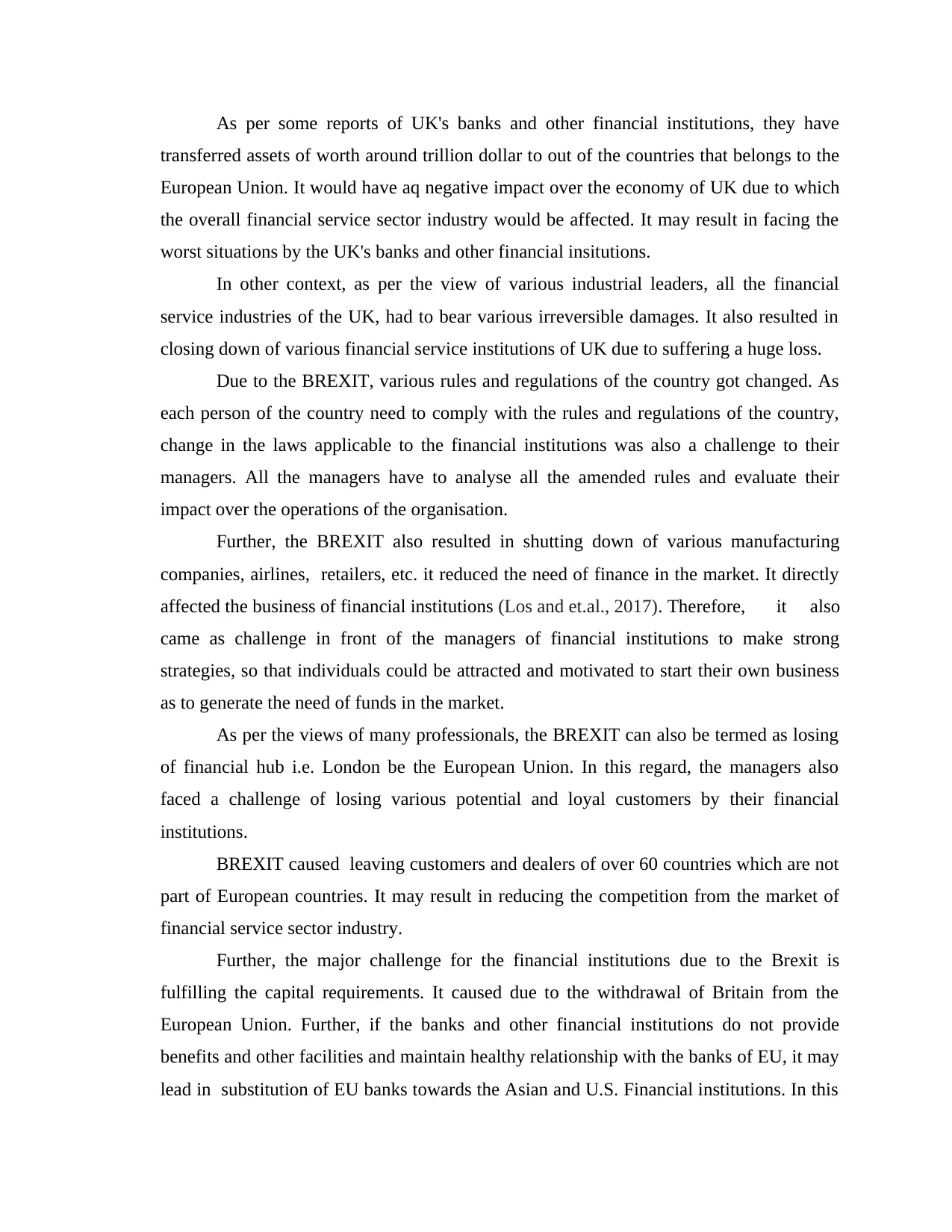
As per some reports of UK's banks and other financial institutions, they have
transferred assets of worth around trillion dollar to out of the countries that belongs to the
European Union. It would have aq negative impact over the economy of UK due to which
the overall financial service sector industry would be affected. It may result in facing the
worst situations by the UK's banks and other financial insitutions.
In other context, as per the view of various industrial leaders, all the financial
service industries of the UK, had to bear various irreversible damages. It also resulted in
closing down of various financial service institutions of UK due to suffering a huge loss.
Due to the BREXIT, various rules and regulations of the country got changed. As
each person of the country need to comply with the rules and regulations of the country,
change in the laws applicable to the financial institutions was also a challenge to their
managers. All the managers have to analyse all the amended rules and evaluate their
impact over the operations of the organisation.
Further, the BREXIT also resulted in shutting down of various manufacturing
companies, airlines, retailers, etc. it reduced the need of finance in the market. It directly
affected the business of financial institutions (Los and et.al., 2017). Therefore, it also
came as challenge in front of the managers of financial institutions to make strong
strategies, so that individuals could be attracted and motivated to start their own business
as to generate the need of funds in the market.
As per the views of many professionals, the BREXIT can also be termed as losing
of financial hub i.e. London be the European Union. In this regard, the managers also
faced a challenge of losing various potential and loyal customers by their financial
institutions.
BREXIT caused leaving customers and dealers of over 60 countries which are not
part of European countries. It may result in reducing the competition from the market of
financial service sector industry.
Further, the major challenge for the financial institutions due to the Brexit is
fulfilling the capital requirements. It caused due to the withdrawal of Britain from the
European Union. Further, if the banks and other financial institutions do not provide
benefits and other facilities and maintain healthy relationship with the banks of EU, it may
lead in substitution of EU banks towards the Asian and U.S. Financial institutions. In this
transferred assets of worth around trillion dollar to out of the countries that belongs to the
European Union. It would have aq negative impact over the economy of UK due to which
the overall financial service sector industry would be affected. It may result in facing the
worst situations by the UK's banks and other financial insitutions.
In other context, as per the view of various industrial leaders, all the financial
service industries of the UK, had to bear various irreversible damages. It also resulted in
closing down of various financial service institutions of UK due to suffering a huge loss.
Due to the BREXIT, various rules and regulations of the country got changed. As
each person of the country need to comply with the rules and regulations of the country,
change in the laws applicable to the financial institutions was also a challenge to their
managers. All the managers have to analyse all the amended rules and evaluate their
impact over the operations of the organisation.
Further, the BREXIT also resulted in shutting down of various manufacturing
companies, airlines, retailers, etc. it reduced the need of finance in the market. It directly
affected the business of financial institutions (Los and et.al., 2017). Therefore, it also
came as challenge in front of the managers of financial institutions to make strong
strategies, so that individuals could be attracted and motivated to start their own business
as to generate the need of funds in the market.
As per the views of many professionals, the BREXIT can also be termed as losing
of financial hub i.e. London be the European Union. In this regard, the managers also
faced a challenge of losing various potential and loyal customers by their financial
institutions.
BREXIT caused leaving customers and dealers of over 60 countries which are not
part of European countries. It may result in reducing the competition from the market of
financial service sector industry.
Further, the major challenge for the financial institutions due to the Brexit is
fulfilling the capital requirements. It caused due to the withdrawal of Britain from the
European Union. Further, if the banks and other financial institutions do not provide
benefits and other facilities and maintain healthy relationship with the banks of EU, it may
lead in substitution of EU banks towards the Asian and U.S. Financial institutions. In this
Paraphrase This Document
Need a fresh take? Get an instant paraphrase of this document with our AI Paraphraser
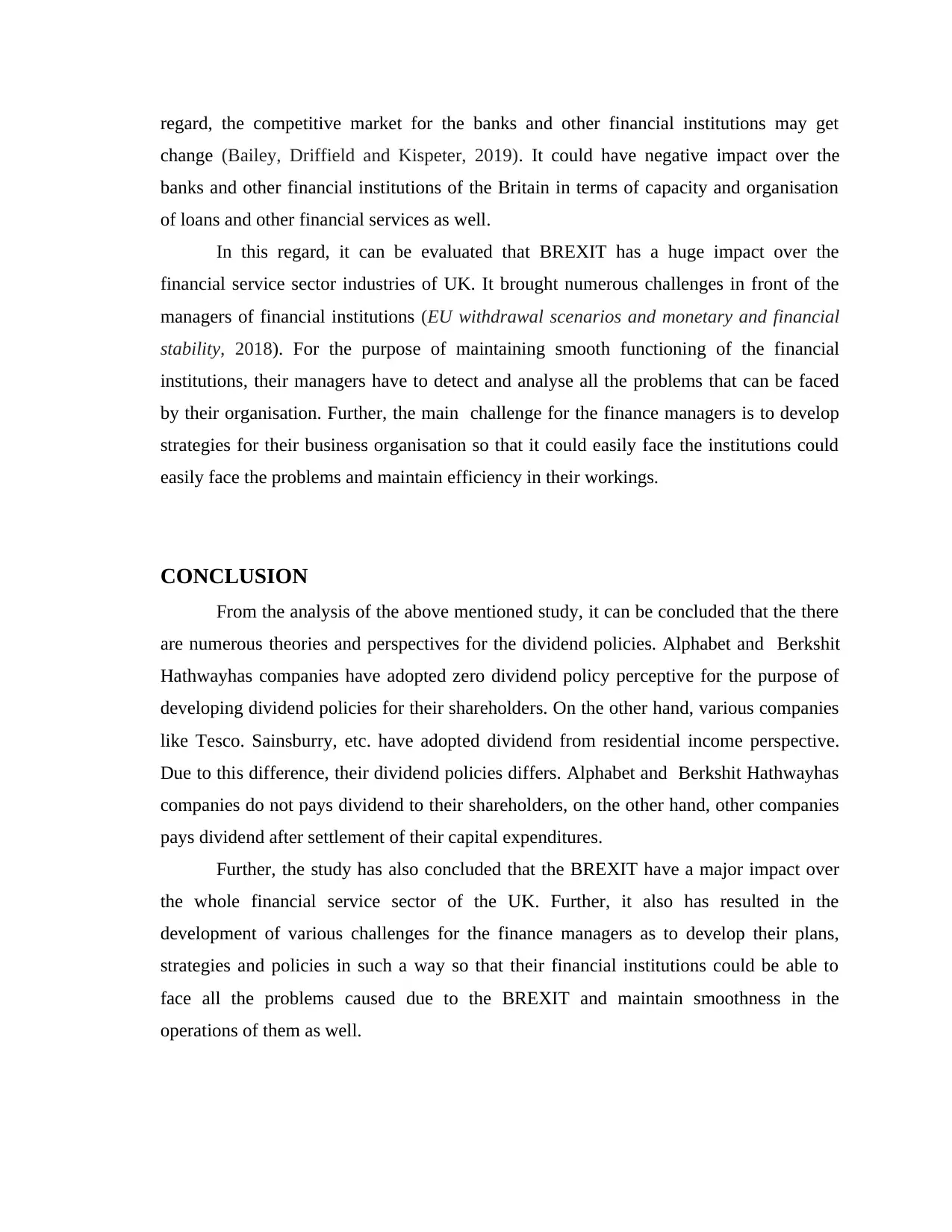
regard, the competitive market for the banks and other financial institutions may get
change (Bailey, Driffield and Kispeter, 2019). It could have negative impact over the
banks and other financial institutions of the Britain in terms of capacity and organisation
of loans and other financial services as well.
In this regard, it can be evaluated that BREXIT has a huge impact over the
financial service sector industries of UK. It brought numerous challenges in front of the
managers of financial institutions (EU withdrawal scenarios and monetary and financial
stability, 2018). For the purpose of maintaining smooth functioning of the financial
institutions, their managers have to detect and analyse all the problems that can be faced
by their organisation. Further, the main challenge for the finance managers is to develop
strategies for their business organisation so that it could easily face the institutions could
easily face the problems and maintain efficiency in their workings.
CONCLUSION
From the analysis of the above mentioned study, it can be concluded that the there
are numerous theories and perspectives for the dividend policies. Alphabet and Berkshit
Hathwayhas companies have adopted zero dividend policy perceptive for the purpose of
developing dividend policies for their shareholders. On the other hand, various companies
like Tesco. Sainsburry, etc. have adopted dividend from residential income perspective.
Due to this difference, their dividend policies differs. Alphabet and Berkshit Hathwayhas
companies do not pays dividend to their shareholders, on the other hand, other companies
pays dividend after settlement of their capital expenditures.
Further, the study has also concluded that the BREXIT have a major impact over
the whole financial service sector of the UK. Further, it also has resulted in the
development of various challenges for the finance managers as to develop their plans,
strategies and policies in such a way so that their financial institutions could be able to
face all the problems caused due to the BREXIT and maintain smoothness in the
operations of them as well.
change (Bailey, Driffield and Kispeter, 2019). It could have negative impact over the
banks and other financial institutions of the Britain in terms of capacity and organisation
of loans and other financial services as well.
In this regard, it can be evaluated that BREXIT has a huge impact over the
financial service sector industries of UK. It brought numerous challenges in front of the
managers of financial institutions (EU withdrawal scenarios and monetary and financial
stability, 2018). For the purpose of maintaining smooth functioning of the financial
institutions, their managers have to detect and analyse all the problems that can be faced
by their organisation. Further, the main challenge for the finance managers is to develop
strategies for their business organisation so that it could easily face the institutions could
easily face the problems and maintain efficiency in their workings.
CONCLUSION
From the analysis of the above mentioned study, it can be concluded that the there
are numerous theories and perspectives for the dividend policies. Alphabet and Berkshit
Hathwayhas companies have adopted zero dividend policy perceptive for the purpose of
developing dividend policies for their shareholders. On the other hand, various companies
like Tesco. Sainsburry, etc. have adopted dividend from residential income perspective.
Due to this difference, their dividend policies differs. Alphabet and Berkshit Hathwayhas
companies do not pays dividend to their shareholders, on the other hand, other companies
pays dividend after settlement of their capital expenditures.
Further, the study has also concluded that the BREXIT have a major impact over
the whole financial service sector of the UK. Further, it also has resulted in the
development of various challenges for the finance managers as to develop their plans,
strategies and policies in such a way so that their financial institutions could be able to
face all the problems caused due to the BREXIT and maintain smoothness in the
operations of them as well.
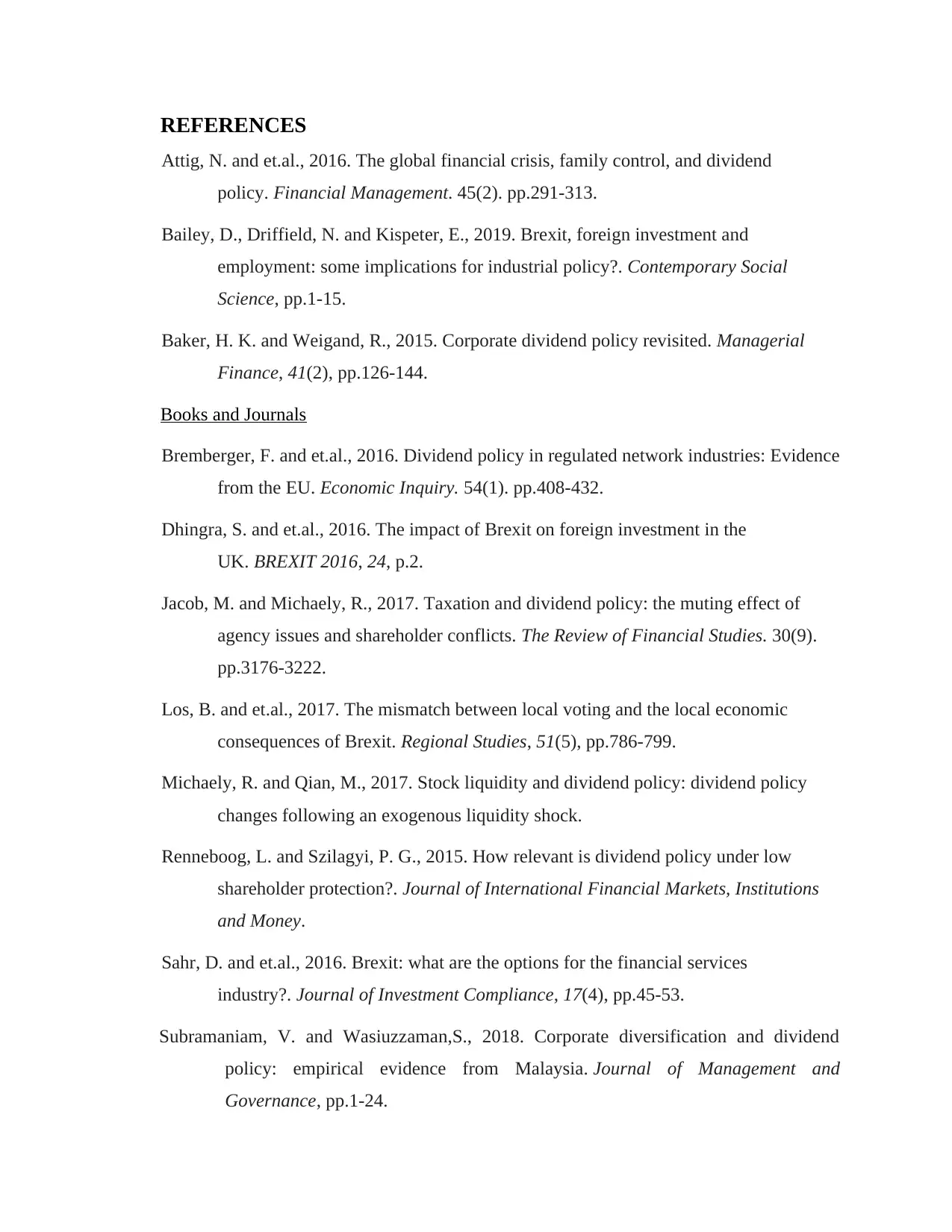
REFERENCES
Attig, N. and et.al., 2016. The global financial crisis, family control, and dividend
policy. Financial Management. 45(2). pp.291-313.
Bailey, D., Driffield, N. and Kispeter, E., 2019. Brexit, foreign investment and
employment: some implications for industrial policy?. Contemporary Social
Science, pp.1-15.
Baker, H. K. and Weigand, R., 2015. Corporate dividend policy revisited. Managerial
Finance, 41(2), pp.126-144.
Books and Journals
Bremberger, F. and et.al., 2016. Dividend policy in regulated network industries: Evidence
from the EU. Economic Inquiry. 54(1). pp.408-432.
Dhingra, S. and et.al., 2016. The impact of Brexit on foreign investment in the
UK. BREXIT 2016, 24, p.2.
Jacob, M. and Michaely, R., 2017. Taxation and dividend policy: the muting effect of
agency issues and shareholder conflicts. The Review of Financial Studies. 30(9).
pp.3176-3222.
Los, B. and et.al., 2017. The mismatch between local voting and the local economic
consequences of Brexit. Regional Studies, 51(5), pp.786-799.
Michaely, R. and Qian, M., 2017. Stock liquidity and dividend policy: dividend policy
changes following an exogenous liquidity shock.
Renneboog, L. and Szilagyi, P. G., 2015. How relevant is dividend policy under low
shareholder protection?. Journal of International Financial Markets, Institutions
and Money.
Sahr, D. and et.al., 2016. Brexit: what are the options for the financial services
industry?. Journal of Investment Compliance, 17(4), pp.45-53.
Subramaniam, V. and Wasiuzzaman,S., 2018. Corporate diversification and dividend
policy: empirical evidence from Malaysia. Journal of Management and
Governance, pp.1-24.
Attig, N. and et.al., 2016. The global financial crisis, family control, and dividend
policy. Financial Management. 45(2). pp.291-313.
Bailey, D., Driffield, N. and Kispeter, E., 2019. Brexit, foreign investment and
employment: some implications for industrial policy?. Contemporary Social
Science, pp.1-15.
Baker, H. K. and Weigand, R., 2015. Corporate dividend policy revisited. Managerial
Finance, 41(2), pp.126-144.
Books and Journals
Bremberger, F. and et.al., 2016. Dividend policy in regulated network industries: Evidence
from the EU. Economic Inquiry. 54(1). pp.408-432.
Dhingra, S. and et.al., 2016. The impact of Brexit on foreign investment in the
UK. BREXIT 2016, 24, p.2.
Jacob, M. and Michaely, R., 2017. Taxation and dividend policy: the muting effect of
agency issues and shareholder conflicts. The Review of Financial Studies. 30(9).
pp.3176-3222.
Los, B. and et.al., 2017. The mismatch between local voting and the local economic
consequences of Brexit. Regional Studies, 51(5), pp.786-799.
Michaely, R. and Qian, M., 2017. Stock liquidity and dividend policy: dividend policy
changes following an exogenous liquidity shock.
Renneboog, L. and Szilagyi, P. G., 2015. How relevant is dividend policy under low
shareholder protection?. Journal of International Financial Markets, Institutions
and Money.
Sahr, D. and et.al., 2016. Brexit: what are the options for the financial services
industry?. Journal of Investment Compliance, 17(4), pp.45-53.
Subramaniam, V. and Wasiuzzaman,S., 2018. Corporate diversification and dividend
policy: empirical evidence from Malaysia. Journal of Management and
Governance, pp.1-24.
⊘ This is a preview!⊘
Do you want full access?
Subscribe today to unlock all pages.

Trusted by 1+ million students worldwide

Online
EU withdrawal scenarios and monetary and financial stability. 2018. [Online] Available
Through: <https://www.bankofengland.co.uk/report/2018/eu-withdrawal-scenarios-
and-monetary-and-financial-stability>
EU withdrawal scenarios and monetary and financial stability. 2018. [Online] Available
Through: <https://www.bankofengland.co.uk/report/2018/eu-withdrawal-scenarios-
and-monetary-and-financial-stability>
1 out of 10
Related Documents
Your All-in-One AI-Powered Toolkit for Academic Success.
+13062052269
info@desklib.com
Available 24*7 on WhatsApp / Email
![[object Object]](/_next/static/media/star-bottom.7253800d.svg)
Unlock your academic potential
Copyright © 2020–2026 A2Z Services. All Rights Reserved. Developed and managed by ZUCOL.





